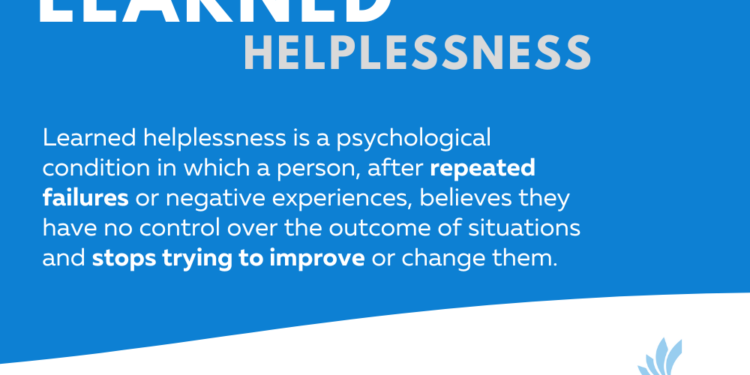by TeachThought Staff
What is learned helplessness?
Definition
Learned helplessness is a psychological condition in which a person, after repeated failures or negative experiences, believes they have no control over situations’ outcomes and stops trying to improve or change them.
Below is an example of Learned Helplessness in the classroom.


Instructor: The biggest fear for an adolescent, written throughout this text, is not fitting in. Jesse, you talked about acceptance. Now, to understand how this happens, how it looks, and what it feels like, we’re going to do an activity. This is an on-your-own activity, and it’s not meant to tax you—these are easy tasks. This is just to get you feeling what we’re going to go over.
Everybody, if you would, take out a short piece of paper. I’m going to pass out these papers—keep them face down. And please, no one write on these; write on your own paper.
Does everybody have one? Now, if you would, just do them one at a time. I’ll tell you when to do them.
See also What Is The Cognitive Load Theory?
Instructor: Everybody, turn over the paper and do your own work. This isn’t meant to be hard. These are anagrams—just do the first one only. Go ahead and solve it. An anagram is where you rearrange the letters to form a word.
Once you’re done, I need to see your hand raised. Keep going, and we’ll wait.
Keep your hands up, please. Just do number one. Don’t go on.
Instructor: Alright, let’s move on to number two. Don’t worry about number one. Go to number two and solve it. Again, when you’re done, raise your hand.
Okay, everybody’s hands down. We’re going to go ahead and do number three. For number three, rearrange the letters, and as soon as you’re done, put your hand up.
Here’s what you need to know: you were given two different lists. This side of the room was given three words. The left side of the room was given these: “bat”—what would the word be? The second word was ‘lemon’—what’s the word, Brian?
See also 8 Of The Most Important Critical Thinking Skills
Brian: “Melon.”
Instructor: Correct. They were easy words. But here’s the trick: both sides of the room were given the same third word, which was ‘cinorama,’ an anagram for “American.” However, your first two words on this side of the room were not solvable—they were impossible tasks.
I’m sorry about that, but here’s why we did this. I was able to induce something called ‘learned helplessness’ in the left side of the room, very easily, within about five minutes. I want you to think about what happened to you, left side of the room, when you saw the right side of the room raising their hands because they had completed the task.
What happened to you during that time? Jory?
Jory: I felt stupid.
Instructor: You felt stupid. Okay. What else?
Joelle: I felt rushed.
Instructor: You felt rushed. Joelle?
Joelle: I was even more confused.
Instructor: You were even more confused because they had already solved it, and you were still struggling. Chelsea?
Chelsea: I was frustrated.
Instructor: Frustrated. What happened by the time you got to the third word? Because I’m here to tell you, this side of the room is not significantly more intelligent than this side. It was a random assignment. So why did you have a more difficult time with the third word, which was the same word? Brian?
Brian: My confidence was shot.
Instructor: Exactly. What you experienced was a term called ‘learned helplessness.’ How many of you have heard of that term before?
Instructor: ‘Learned helplessness’ is often used in academic literature. Jory, do you know what it means?
Jory: Basically, they fail once or can’t do something one time, and then they apply that to everything in the future. So all future tasks become skewed by that.
Instructor: Exactly. And this is what I want everyone to understand. It’s usually only used in academic research—you’ll see it in educational psychology books, in school textbooks. But I’m going to challenge us to think about how learned helplessness can apply to the social scene. Can someone give me an example of how that might look? Tasha?
Tasha: It’s like when a guy asks a girl out and he gets turned down, he’s not going to keep trying. He just stops asking.
Instructor: That’s correct. Now, I want us to think about girls. We’ve talked about Reviving Ophelia here. Think about how this applies to friendships. Can learned helplessness be induced in friendships? It’s tough to establish and maintain friendships—it’s a difficult process.
If a girl sacrifices her morals once to gain the approval of her friends, or a guy, she’s more likely to keep doing it, right?
Instructor: And I’ll just put this out there to be explicit: If Carl is victimized once in grade school, is he likely to stand up for himself the next time?
Students: No.
Instructor: And what happens the next time? And the next? What we know—and this is what we’ve been learning—is that girls have a cultural pressure to be quiet. Girls have a cultural pressure not to be angry, not to use their voices. So if someone is victimized once—if Alison is victimized once—we can take that same concept of learned helplessness and apply it to social relationships.
So, the moral of the story is, it’s important for girls to practice dealing with failure. Because our gut response, when we fail, is to shut down. And when you shut down, you don’t open yourself up to learning new ways for relationships.
This version separates out the speakers, clarifies transitions, and adds punctuation to make the flow clearer. Would you like any further edits?
Full transcription provided by YouTube
TeachThought’s mission is to promote critical thinking and innovation education.



















